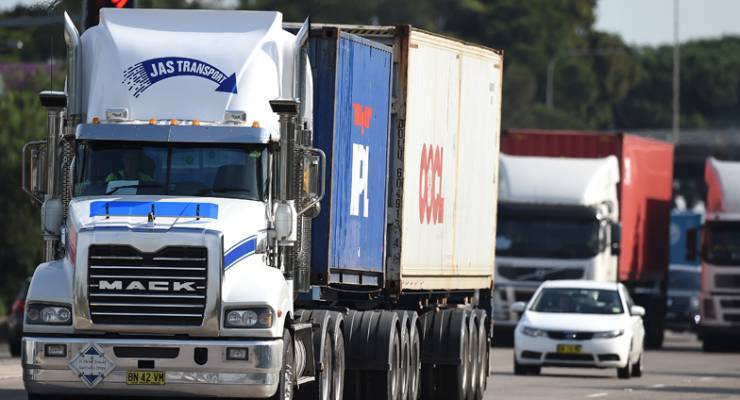
Most people don’t spend a lot of time ruminating about how all our stuff — our food, our electronic goods, our furniture — gets to us.
That’s fair enough. Talk of ports, landside connections, freight chains, and intermodal hubs is not generally going to win you too many avid listeners.
Yet the relatively small handful of companies that manage these operations are enormously powerful. They control a massive chunk of our economy and employ tens of thousands of people. They matter.
And that’s why the attempt from logistics companies Qube and Brookfield Infrastructure to eat their main competitor, Asciano, matters. If Coles tried to acquire Woolworths to create one giant super-supermarket there would, quite rightly, be a nation-stopping uproar about it.
We desperately need just a fraction of that public attention on this proposal.
Because when a powerful player like Qube is willing to pay well above the market rate for an acquisition, it is generally safe to conclude that player wants to fundamentally change the nature of the market.
As the NSW Deputy Opposition Leader Michael Daley recently pointed out in Parliament, “if Qube acquires Asciano, it will be vertically integrated on an unprecedented scale in Australia; no one in the history of the Australian supply chain will have had greater ownership of all links in that supply chain.”
If this sounds hyperbolic, consider the influence Qube would enjoy over the economy if the deal were to go through. Put simply, Qube would have a ship-to-shop chokehold over what gets into some of the country’s most populous centres.
Insurmountable advantages to Qube would pile up from every angle. It would, for example, be able to use aggressive discounting of its landside business to secure customers and direct them to shipping lines that only dock at Qube’s terminal.
And once Qube has control of the jewel in the crown — the monopoly intermodal facility at Moorebank — it would then be able to essentially unload ships directly to the facility.
Any smaller rivals would have to deal with Qube at Moorebank, which is expected to be handling a million containers a year before 2030, as both landlord and competitor. And what kind of rent would Qube charge a direct competitor?
The Transport Workers’ Union has deep concerns about what this kind of situation would mean for workers, especially owner-drivers.
Without a terminal cross-subsidising them, or a stranglehold across the rest of the market, Qube’s smaller rivals would be desperate to slash costs.
Unfortunately, we are now extremely familiar with what happens to drivers and road safety when such cost pressures come to bear. Unsafe pressures immediately start piling up on them, especially in the relatively unregulated owner-driver sector. We know exactly how this would play out, because it has already started.
Trucking is Australia’s deadliest profession, with drivers 12 times more likely to die at work than other workers. In the transport industry, 20% of employers break safety rules to meet deadlines, compared to 6% of employers in other industries. And things are getting worse.
A still relatively rare, but growing, trend, for example, is a shift away from hourly rates for drivers in favour of so-called “box rates” — payments per shipping container moved.
We are increasingly hearing of migrant drivers on box rates working up to three days straight without sleeping in order to scrape together enough money for their families.
We know of trucks with potentially disastrous safety issues, because their owners cannot spare the time or resources to maintain them adequately, while being incentivised to simple move as many boxes as possible.
Fortunately, most bosses in the industry currently recognise this practice to be dangerous and unethical. The conventional wisdom has tended to suggest it creates more risk than reward.
Yet if companies suddenly feel extreme pressure from a new colossal and disproportionately advantaged competitor, you can bet that the short-term savings presented by box rates will quickly become irresistible.
Of course we know that when the ACCC hands down its interim decision on the Qube purchase proposal this month, it will not be greatly influenced by considerations relating to the safety and employment conditions of workers.
Yet this should scarcely matter, because Qube’s proposal would kick open the door to a practice of keen interest to the competition regulator: predatory pricing.
As soon as customers have been lured and incentivised into using Qube’s highly profitable terminal business — as soon as rivals and their employees have been hustled out of the market — you would hardly want to be betting on the new giant’s altruistic spirit to keep prices low.
Qube’s inevitable price hikes will also, of course, find their way back to consumers, driving up the price of just about everything.
In fact, we don’t even have to assume what would happen, because we have a real-world case study in Qube’s empty container operation in Fremantle, where it controls more than 90% of the business. Without significant competition, the rates in Fremantle are, of course, much higher than those charged in Sydney, Melbourne and Brisbane.
Yet as well as being bad for customers and for the economy, Qube’s market dominance would also create a more concentrated jobs market that would directly lead to fewer employers and fewer jobs in the industry.
In fact, the more you turn this proposal over, the uglier it gets.
We must now hope that the ACCC has its eye firmly on the horizon as it assesses Qube and Brookfield’s audacious bid for dominance.







Owner drivers are an anachronism that benefit only the big companies.
There should be no HGV at all grinding our main roads to potholed obstacle courses.
All containers should go via rail to regional hubs and then owner drivers can deliver safely and live at home.
And, as a bonus, Linfox et al can go broke.
Win/Win/Win.
A very worrying article.
The over-long driving will continue until a senior politician loses most of their family under a long distance truck.